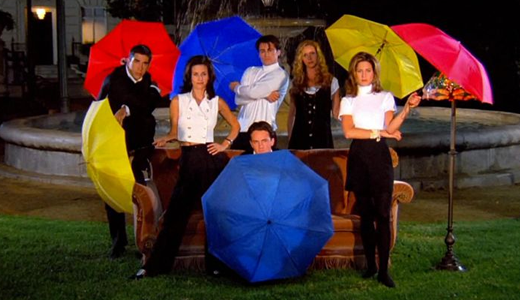The widely beloved 1990’s sitcom Friends will officially celebrate its 25th year anniversary on Sept. 22. That’s right, people. Twenty-five years. That’s a long time. And somehow, more than two decades later, people around the world are still down to chill with the Central Perk gang. In fact, viewers are so adamant about their Friends viewing that Netflix paid Warner Bros. Domestic Television Distribution nearly $80 million to keep it on their streaming service for 2019. Apparently Friends is worth the hefty price tag. But why?
If you’ve ever watched an episode or two, you’ll quickly realize (significant content issues aside) that Ross, Rachel, Chandler, Monica, Joey and Phoebe share a strong bond– a bond so strong that viewers around the world were locked in for 10 seasons of friendship, drama and laughter. The show gave us a tight-knit community–a lovable group of flawed individuals who were always better when they were together. And that says something about us as humans, don’t ya think?
In our fast-paced, technologically addicted world, it’s easy to forget how much we need one another when we can (ironically enough) settle for binging Netflix shows instead of building relationships with one another. It can be a lot easier to turn on the TV, or drown ourselves in endless scrolling, than to purposefully work on creating friendships. Because relationships and people are messy.
Perhaps that’s why Christianity Today published an article that said Christians are growing in their faith, but they feel they can do so without others. There is a ton of irony here, given that the Great Commission is all about reaching people with Good News, but I can see where this fits in to our current smartphone culture.
When asked about how Friends might do if it were created in 2019, Jennifer Aniston said it couldn’t be done: “…You would have a coffee shop full of people that were just staring into iPhones. There would be no actual episodes or conversations.”
That may be a bit harsh, but we are, as experts like to say, a depressed, anxious, and lonely generation. And while a variety of factors play into this, a lack of community is definitely at the top of the list. We’re lonely because we’re disconnected from actual human interaction. We’re disconnected because it’s often easier than facing reality.
To be fair, sitcoms aren’t reality. They make conflict resolution and marital issues look like a walk in the park—issues to be solved in 30 minutes, counting commercial breaks. Those watching know that life is actually much harder than is portrayed. But maybe that’s why we’re watching TV, actually. Maybe we’re consistently glued to our screens because it allows us to have the things we don’t have—or we feel are just too difficult to get—in our everyday lives.
That’s sad. And I’ve been one of these people. I do have a tight-knit group of friends, but it’s taken a really long time for me to cultivate these relationships and to seek people out. Especially since I’ve moved more times than I can count. And to be honest, sometimes watching a group of friends on TV has been my go-to when I’ve felt like I don’t have any of my own.
But as I’ve taken the time to invest in the people around me, I’ve realized that humans are what life is all about. Netflix and Amazon can’t make you a cake at the end of a long, hard day. They can’t encourage you, or hug you or listen when you need an ear. Relationships are hard, yes. But with all that messy vulnerability and human error comes a lot of beauty and a lot of grace.






Recent Comments